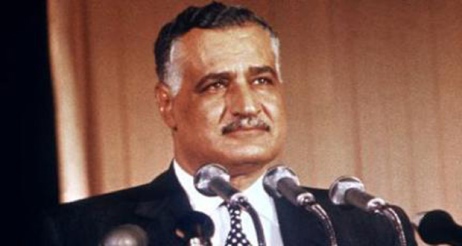By: Hassan Kamal
Many Western scholars consider the former president of Egypt Gamal Abdel Nasser as a secular ruler and describe the nature of Nasser’s regime as a secular state because of his stance on the Muslim Brotherhood after the “Manshiyya incident” where the Muslim Brotherhood tried to assassinate Nasser in 1954, and also for some extra reasons I am going to highlight it in this article. On the other hand, other scholars from the Middle East countries, especially from Egypt argue that Nasser wasn’t secular and he was just a nationalist ruler and against the Muslim Brotherhood for political reasons not for ideological reasons. So, he wasn’t a secular ruler for some evidences that will be demonstrated. In this essay, I will look at both sides of the argument and give my opinion with references.
Firstly, one of the most important reasons that Nasser wasn’t secular is that Nasser himself was a member of the Muslim Brotherhood, and this evidence is neglected by many Western scholars. Nasser before the 1952 coup, he joined “the Secret Assembly for Army officers” in 1942 with other the Free Officers from the Army that is an affiliate of the Muslim Brotherhood, and since this time Nasser was an active member of the Muslim Brotherhood. Consequently, Nasser wasn’t secular as many Western scholars claim because of the Muslim Brotherhood’s ideology is Islamic fundamentalism that is opposite to secularization as a way of thinking based on relative not absolute truth. (Read the references that is mentioned bellow that affirm Nasser was a member of the Muslim Brotherhood before the 1952 coup).
Secondly, in the 1956 constitution of Egypt that was adopted by Gamal Abdel Nasser in public referendum, the article three is “Islam is the religion of state” and subsequently all the bodies of Egypt have to respect the religion of state that is Islam. And this indicates to the way of thinking at this time that was close to the Muslim Brotherhood not to secularization. (Click here to download the 1956 constitution of Egypt).
Thirdly, Nasser himself appointed Kamal al-Din Hussein who was a member of the “Free Officer Movement” and the Muslim Brotherhood at the same time, to be responsible for ministry of education. And most importantly, there was a dialogue before the 1952 coup between Nasser and Hassan al-Hudaybi, which was the second “General Guide” of the Muslim Brotherhood organization, expressed his wishes to take control of Egypt by dominating the education system in order to control the Egyptian human reasons to Islamization the state institutions. Therefore, employing a leader from the Muslim Brotherhood as Kamal al-Din Hussein for the ministry of education was an agreement between Nasser and the Muslim Brotherhood, and this shows that Nasser didn’t have a problem with Islamic fundamentalism that is the main ideology of the Muslim Brotherhood and of course it is against secularization.
On the other side, many Western scholars argue that Nasser was a secular ruler because he refused to obey the Muslim Brotherhood in 1953 to make women wear a headscarf, however, in the same video that Western scholars rely on to show Nasser as a secular (Click here to watch the video) Nasser himself said that he welcomed to operate with the Muslim Brotherhood. So, that video itself proves Nasser was a member of the Muslim Brotherhood and he didn’t have a problem to work with them. In addition to that, his objection on veil doesn’t show how secular he was.
To sum up, Nasser was just a nationalist ruler and he was a member of the Muslim Brotherhood before the 1952 coup through his membership of the Free Officers that led a coup of the so-called Free Officers that brought to an end to the rule of the former King Farouk and his son Fu’ad II. And after the coup Nasser welcomed to work with the Muslim Brotherhood but they wanted to take control of the entire country against Nasser’s wish that led to disagreement between Nasser and the MB. Consequently, the MB tried to assassinate Nasser in 1954 of the so-called “Manshiyya incident“. And after this action Nasser arrested many leaders of the MB who was accused trying kill Nasser. So, Personally, I believe that Nasser wasn’t secular and he was just against the Muslim Brotherhood for political reasons not for ideological reasons and this clash between the army and the MB still exists so far and led to the 2013 revolution and ouster the Muslim Brotherhood from power by army based on the revolution June 30,2013.
References:
- The Muslim Brotherhood’s website.
- An interview with a member of the Free Officer
- The 1956 constitution of Egypt
- Now I am Talking by Khaled Mohieddin – page 45
- Secrets of the Free Officers and the Muslim Brotherhood by Hussein Hammouda –page 32
- Made Farouk to resign by Abdel Moneim Raouf – the preamble
- The Truth of disagreement between Nasser and the Muslim Brotherhood by Mohammed Hamed Abu-Nasr – page 60
- A speech by Gamal Abdel Nasser on the Muslim Brotherhood
Categories: Essays - مقالات


Reblogged this on حركة مصر العلمانية – منتدى ابن رشد.
LikeLike